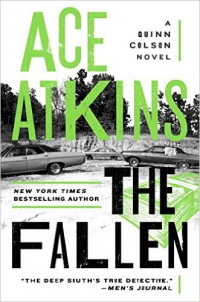Change Agent by Daniel Suarez
 Monday, August 7, 2017 at 8:21AM
Monday, August 7, 2017 at 8:21AM 
Published by Dutton on April 18, 2017
Daniel Saurez envisions an anti-science American future in which stupidity has overtaken reason. Sadly, that doesn’t take a great deal of imagination, since the future is now.
Most people in Saurez’ near future don’t believe in evolution, advances in synthetic biology are blocked because “every cluster of human cells” is viewed as a baby, and opinions spread on social media carry more weight than peer-reviewed research. As a result, real science moves offshore and the American economy crumbles in competition with economies in places like Singapore that take science seriously.
Kenneth Durand is in Singapore, gathering intelligence for the Genetic Crime Division, which tries to shut down labs that provide illegal genetic enhancements that allow parents to breed superior babies. But the trendy thriller crime at the moment is human trafficking, so Change Agent posits that human trafficking gangs are harvesting genetic material from the refugees they traffic and selling the data to a genediting cartel that, in turn, operates a cloud computing service that embryo mills rely upon for genetic modeling. The cartel is building a global genetic database, which it seems to me they could more easily do by acquiring saliva from a large number of people, but as I said, trafficking is trendy, so there you have it. But since gathering spit from trafficking victims doesn’t seem like anything to get excited about, Saurez throws in “illicit baby labs” to provoke the reader’s outrage.
The story becomes more interesting when Durand is administered a “change agent” that changes him (in terms of appearance and DNA) into a wanted criminal. Durand spends most of remainder of this action novel trying to get changed back. He travels around Asia, bypassing immigration authorities, in a series of adventures that will lead him to the criminal whose shape he has taken.
There are some cool ideas in Change Agent. Crowd-sourced policing, the intersection of molecular printing and designer drug abuse, new ways of exploiting refugees, cities in international waters made from the hulks of decommissioned ships, engineered famines that force tribal people to accept corporate land development, the need for legal protection of one’s own genetic data (to prevent hundreds of Scarlett Johanssons, for instance, from competing with the original), ownership of gene sequences as a form of slavery, the legal complexity of prosecuting someone for a crime who is no longer (genetically speaking) the person who committed the crime, and the nature of a post-identity world are among the interesting concepts in Saurez’ imagined future.
The story also illustrates some of the ethical issues involved with in vitro genetic manipulation. Children of the rich, already advantaged by wealth, are the most likely to be advantaged by genetic enhancements, leaving the poor even farther behind. But it’s just as easy to create docile children with a low IQ who contentedly perform manual labor and don’t demand higher wages. Or soldiers with enhanced fighting skills but without compassion or empathy.
The story is stronger in background and ideas than in plot (which is a fairly typical action story) and characterization (which is about average for genre fiction). The book could probably benefit from a 100-page trim, but for its vision of the future and a couple of entertaining action scenes in Asian jungles, Change Agent is worth reading.
RECOMMENDED



